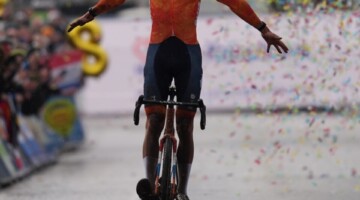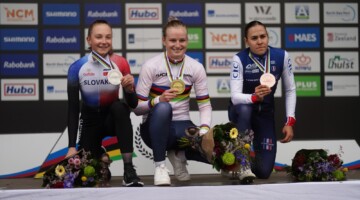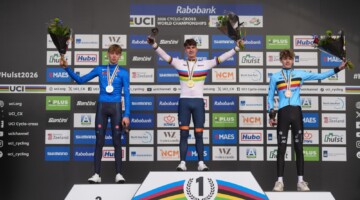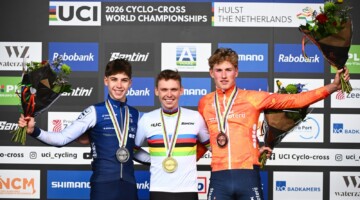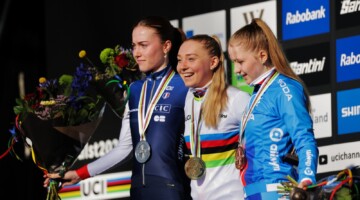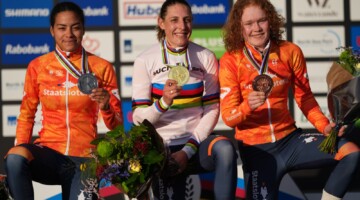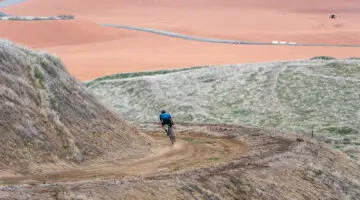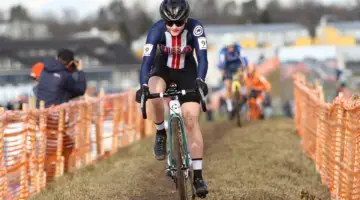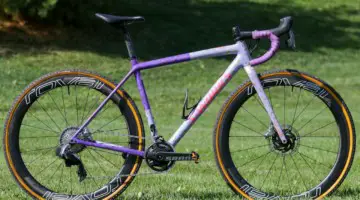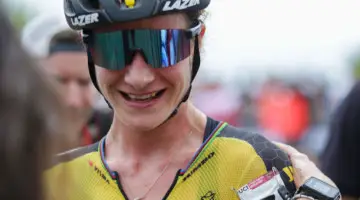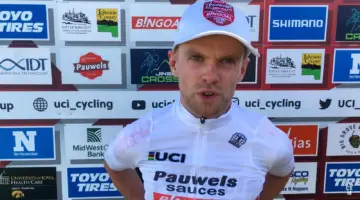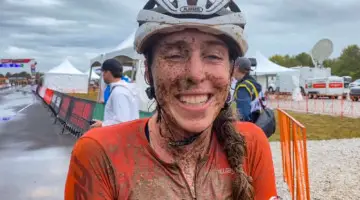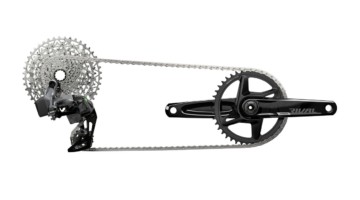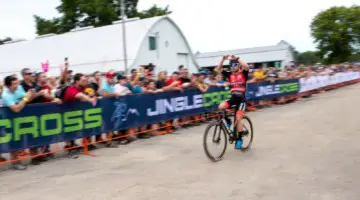When we last chatted with Jeremy Powers after Reno Nationals, he said he was working to find sponsors for the upcoming cyclocross season.
About a month ago, we caught wind that he had found sponsors for a program to race the 2018/19 cyclocross season.
We reached out to Powers to get the 411 on his new program. We also asked what the four-time national champion has left to achieve, how his new Fuji bike is riding and how only worrying about himself will be after several years doing Behind the Barriers and running Aspire Racing.
Interview with Jeremy Powers About His Pactimo-Fuji-SRAM Program
Cyclocross Magazine: To start out with the old softball, how is Finn doing and is he out on the balance bike yet?
Jeremy Powers: He’s a busy boy. Everything with him is perfect and he’s healthy and smiling every day. We’re very lucky and we’re having a lot of fun with him.
CXM: So I’m pretty sure that Myerson’s kid Flynn is also out on the bike, so maybe we can expect to see them in the kids’ race at Nationals this year?
JP: Finn can’t even talk yet. So maybe. Do they let one-and-a-half-year-olds do the kid’s race?
CXM: I’m pretty sure for Jeremy Powers and Adam Myerson they would, I mean if they could handle the course.
JP: That might be getting a bit ahead of it, just age-wise, but yes, for sure down the road, no question.
CXM: So since you’re heading to Rochester, I looked at the BikeReg site and it said that you are racing for Aspire Racing, which I thought was kind of funny. Our first question was, what is the official name of your new program?
JP: The business is still Aspire Racing because that’s what I run everything through. But it’s Pactimo Fuji SRAM, that’s just what I’m going to put on all of my registration paperwork. Pactimo, Fuji and SRAM are the three biggest brands helping make this possible. It could be Aspire Racing, it could be those three. It doesn’t really matter, honestly. No one specifically bought a title sponsorship to the program, but they’re the biggest contributors.
CXM: Last time that we chatted with you was in January, I believe, right after Nationals, and you said you were reaching out to potential sponsors. How did everything come together for you? To race again this year?
JP: Well really I was just looking at it, and the reality was I was going to go stir crazy if I stopped this year because I think I felt like I owed it to myself to do another year. After I had sort of cut ties from the team and knew things were going to end, I was like, okay, I can focus on myself again. I started doing a lot of good training into Nationals, and although Europe didn’t go as well as I had wanted to, it was really big for me to train and get back to a good level.
When I let everything expire in terms of the contracts, it was good to kind of let things go. It allowed me to actually stop mentally and see what it would feel like to be sponsorless and not have anything to look forward to or have any constraints. I found I wanted to train and I wanted to race.
I ended up doing a pretty good gravel season, although I didn’t really go for the wins at a lot of the races. I was doing 20 hours a week, and I was training pretty good through [building a] base, so I felt like that was enough to give me the sense that, yeah, you should see if you can get some sponsors together and put a program in place for this year, whatever that means. If that means 20 races, great. If that means five races, great. I had no idea what it would actually entail, so here we are.
CXM: Last year was an up and down season, but you had an incredible ride in Reno. Did that play a role in your decision to race again?
JP: Yeah. Before Reno I was able to do a dedicated block of training, so I went away to New Mexico. It was at altitude. I trained and then I got a benefit from the training. A lot of times last year I had done training, but I hadn’t gotten the benefit of it because I was too stressed either doing stuff with Finn or doing things with the team and things like that. I don’t think I was at my best for a lot of the season.
So when I finally said to everyone, hey the team is going to stop, then I focused on training directly for Nationals. I felt like that gave me a good place to jump from because whether it was indirectly or directly, I the team was very important to me, and I didn’t want to let anyone down there.
I only have so much bandwidth, and it ends up taking away from my ability to focus on myself because I’ll give more than I can do to make sure that things look and feel a certain way.
I felt like that training camp I did in New Mexico leading up to Nationals, I did it the year before and I went to Hartford and had a terrible race. Just that whole season was pretty bad, to be honest. Then when I went this year and was able to produce a good result at Reno because mentally I turned off from being a team owner. I said, okay, the team’s ending, this is going away. Whatever we have is in the till and whatever is out is out, and I can move forward from that.
That gave me the ability to train really well and to focus on myself and know that there an end in sight, which I think is, to me mentally, that was really, really important. And then to actually get to the fitness level that I had that I got to at Reno is also really important for me because, um, it, it reinforced what I already knew, which was that the stress of life, you know, all of these things. It did impact me in some way, which is why I think this season is, is so important to me because I was able to put together a group of partners that believed in what I’m doing and believed in me to race a good season. And now we will try to put it together.
CXM: I guess it’s kind of interesting that, but seeing you race earlier in the season then seeing you at Nationals was like the Jeremy Powers of old. It was visible from just watching you and it was from my perspective, seeing you back at the top and looking like your old self was great to see and I think the fans benefited from it as well.
JP: Yeah, someday when I write a book I can go into it all. For me, it’s just how I deal with stress. It’s not that I’ve ever stopped working hard. I think it’s just that I take on a lot and for better or worse, that’s what happens. Like I can’t do both at the same time and do them well. One looked good at least from the outside. Ellen did well and Spencer did well and the team did well, but internally, it was just too much for me to juggle.
CXM: For the past forever, you’ve been doing stuff to help the sport, arguably as much as you’ve been helping yourself. Whether it be BtB or Aspire Racing, how do you think this year is going to be different with it just being about you, the bike and racing?
JP: I’m going to send you a picture.
Tom is in the front seat. I have two mechanics this weekend, and I’m in the back with an exorbitant amount of space. It’s like a limousine back here. Not to brag, but I have my legs up and the only thing we didn’t get done was the window tint. But other than that, every single thing we got done before the weekend. I’m pretty happy and it didn’t stress me out beyond belief.
The amount of work I have with this program is similar to the way I used to race from 2013 onwards. 2014, ’15, ’16 before I signed Ellen. And gosh, it feels really good. My head is not spinning, and I mean that literally and figuratively. My head is not actually spinning. I feel good as I drive away from my house with the things that I needed to do and only worried about myself.
For videos, we’ll do videos. I’ll do a lot of social this year, but it will be more direct. Like still be about me, and it will be about my personality and what my experiences are at the races. It will be fun and continue to be inclusive and all that, but it’s not going to be a dedicated, you know, 12-part series with a budget put towards it and all the things that go along with that.
CXM: Wait, you have a personality? I think these videos are going to be really boring. I’m just kidding.
JP: Ahhhhhhh.
CXM: When we talked to you earlier this year, you talked a little bit about the idea of a solo program and teams and how the cyclocross landscape is changing. Did you give any thought to trying to get with a team like Cannondale, or was it always going to be a solo program?
JP: Yeah, I had gotten an offer. Not from Cannondale, but I had gotten an offer and some people had asked about what I was planning to do. For me, I’ve already been so far down one street, I think if the program was hyper-polished, and it was a plug-and-play scenario where they have a lot of support behind it, I would have said yes. But for me, I know I can do it the way that I’d like it to be done.
I entertained the idea, but it wouldn’t have fitted my needs and what I’d like to do with this last season or last season or two because I’d like to bring my family with me to some races. I’d like to have my own rig. Some things like that I think are probably possible in the right team environment, but I was gung-ho about looking out for myself without any other expectations.
CXM: Not everyone realizes that Fuji has a long history of being the cyclocross bike for riders like Paul Curley, Mark McCormack and Jonathan Page. Have you given any thought to what it means to be following in the footsteps of those great riders on a Fuji bike?
JP: Paul I grew up racing with. Paul taught me a lot when I was a Junior racing the Junior races, and Mark as well. Mark and Paul both did. I don’t remember when Jonathan was on a Fuji. I don’t remember it well, but I do remember he was on one. I think it’s cool.
They have a really beautiful bike that is of the right century. It has flat mount brakes and it’s set up for wireless shifting. It’s a beautiful bike, and they didn’t have a pilot, so I’m excited to showcase this bike. I hope it opens some people’s eyes to the worthiness of it, and I think they’re readily available, and they’re a good option for people who are looking for a cyclocross bike and want something they can maybe double up with as their gravel machine or whatever.
I think it’s cool. I think Mark and Paul and Jonathan are all great riders, and I’m happy to be the next rider in that, in that lineage, I guess would be the right word for that.
CXM: Are you going to be riding the stock frame, or can you tell me a little bit about the frame and how it rides compared to the Focus?
JP: The geometry is slightly different, but it is not exorbitantly different. I’m still running SRAM. I’m still running Zipp. I’m still riding on FMBs. So a lot of components are still the same as what I used in the past, so I’m familiar with them.
The bike rides awesome. I’ve been riding it a lot. There are some slight differences that I’m still trying to get used to. Just going hard on the bike is a little different than it used to be. I just need to figure out how it handles in this little teeny, tweaky technical section. There are just some small things, like it just handles a teeny bit differently, but not in a bad way.
The bikes are custom painted. Everything looks and feels like a pro team should. Bikes, cars, clothing, everything is custom, and there’s nothing that’s standard on any of these bikes.
CXM: Performance Bike shares the same owner as Fuji and sells the Altamira CX bikes. Are you going to be doing any events for them to promote the brands?
JP: I hope so. I think that the Performance angle is cool. I have had a chat with them, like a general season intro, but we haven’t decided on any events.
I’ll be doing some things with Pactimo and their pop-up stores. Notably the Cincinnati Cyclocross weekend, I’ll be there for the C1, but then I’m flying back to do a ride out of Philly, and hopefully we’ll be able to tie in some of my sponsors like Fuji because they’re going to be down in that area.
So yeah, I think there could be some stuff with Performance down the road, whether that’s like immediately, or a little bit down the line because the deal is for a year, and it also includes a gravel program in the spring as well.
CXM: How is your heart doing? Has it been affecting your training at all or what’s kind of the status update?
JP: We will see now that I’m going to start going really hard for an hour, but I’ve trained all summer, and knock on wood, I have not had any mishaps or whatever. I do really believe it was rooted in stress and a lack of sleep, primarily because of having a newborn.
I can’t say for sure, but these things come and go. I think right now I feel really confident, and I just feel better when I’m going hard. Whether that’s less tension in my body, I honestly don’t know why.
I’m not the most fit that I’ve ever been in my life, I’m not the leanest I’ve ever been in my entire life, but I’m good on both those things, and I feel like I have a good, strong base underneath me from riding in the spring and summer. I think I’m going to be competitive, and I think my heart is totally fine. I think my body is in a good place, is what I’m trying to say with all that.
CXM: Not that I’m capable of performing anywhere near your level, but when I was finishing my Ph.D., I was stressed beyond belief, and it took a toll on my ability to ride. I can only imagine how much of a toll it took on you.
JP: Yeah, I think so. And I think it’s how you deal with it. Like, if you have to get up and go to work every day, it’s somewhat fine and you can deal. You’re not talking about needing to ride your bike at 500 watts for an hour. Because 400 is different than 500 when you’re at this level. I’m being totally sarcastic with numbers, but you know it’s 10 watts here, 20 watts there. It’s a little bit of sleep here, and then before you know it, you’re like man, I’m just not feeling great.
Which is why the Europeans take it so seriously. You can respect it because they would be like, no you can’t do it this way. It’s just not the right way to do it. They would have seen me last year and just shrugged their shoulders. They would have said it’s too much stress for you.
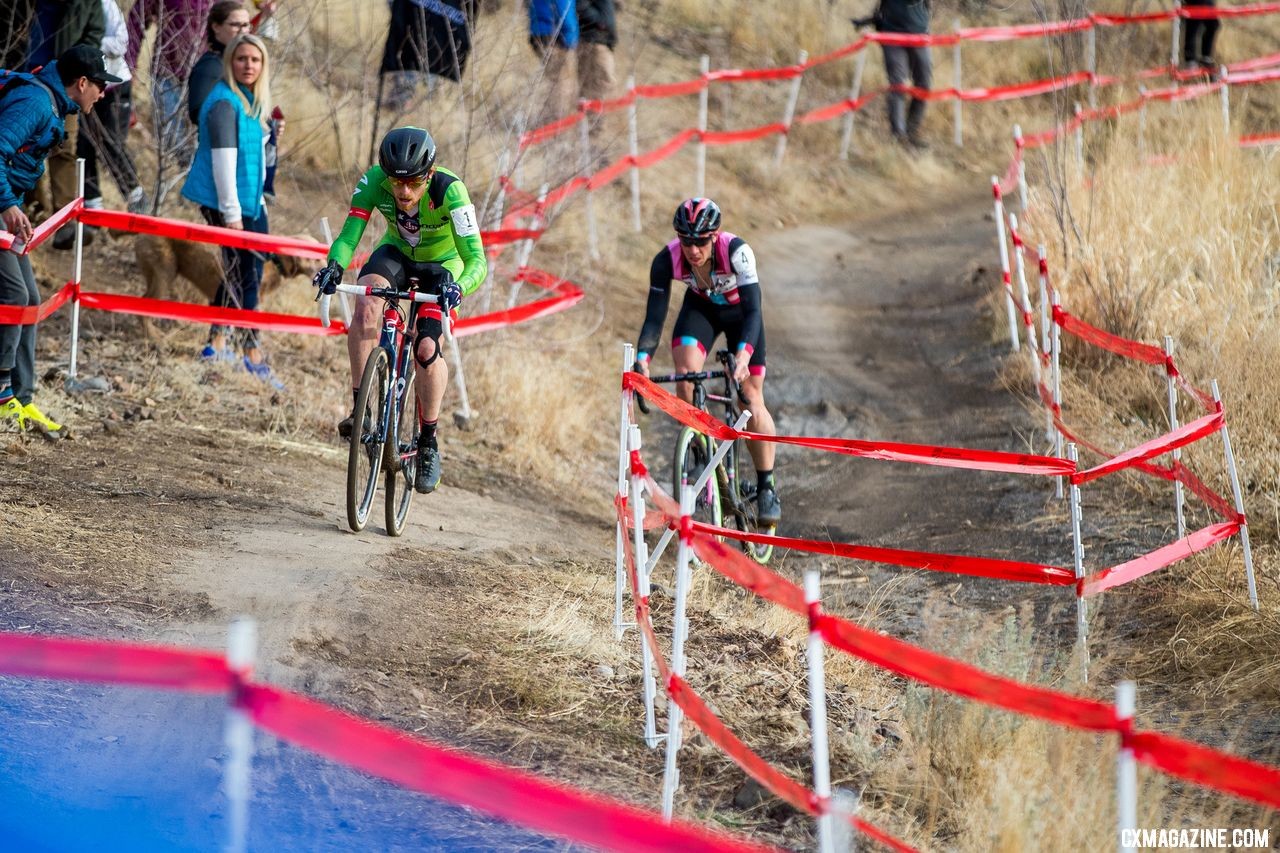
Jeremy Powers had a battle for the ages against Stephen Hyde at Reno Nationals. 2018 Cyclocross National Championships. © J. Curtes / Cyclocross Magazine
CXM: My next question is kind of a deep one. You’re 34, 35?
JP: 35.
CXM: Welcome to being a Masters racer at most local series. What do you have left to accomplish in your career, or what are you hoping to accomplish with these last few years?
JP: I think just truthfully, this year is really about that last title. Whether it be the Pan-American Championships or the National Championships, those are the races I have a very real focus on, and I will prepare to try to win outright out of the gate. My goal is to win one of those jerseys. Whether I win one or I don’t, that’s just a goal. I need a goal. And so those are the two goals.
If I have a great season, if I win some races, I’ll be happy. If I’m competitive, I’m racing out of another generation now. Spencer and Gage and the younger riders are another generation that came up about two years ago. I’m not a spring chicken and this is a young person’s sport.
I’ve done well when I was young and loved it. I think I can still compete and race in a different way but still be really good. I love the community. I like racing. I like being out there. I like that it pushes me as a human.
CXM: When we were looking back at Nationals winners, It was interesting that there was that group of Page, Trebon and Johnson competing and then you kind of crashed the party. Right now, there’s talent from all the way down to Gage and Spencer at age 20 to Tobin to Kerry to Hyde. What are your thoughts on this season and what are you expecting from the racing?
JP: Yeah, I think those guys will make the races. I’m not ever going to discount how good they are. I think those riders are the best we have, I think over the years they have refined their craft. Tobin was exceptional last year, especially with his sprint. I have to give him a lot of credit for the season he put together. He won a majority of the races he entered, and he beat us all in the sprint finishes because no one had that extra one percent to pop him.
You know, picking a specific rider, I don’t know what to expect. It looks like everyone’s at a pretty good level, if I look at the GO Cross results. But it’s such an unknown, how a rider grows from year to year. I mean that’s the thing with someone like Spencer or Gage, they can come out and win everything if they want to. They’re both dedicated to cyclocross. And there’s a lot of other riders I haven’t mentioned like the Colorado crew. A bunch of those guys were on the Worlds team. There are Junior riders who are exceptional right now. It’s hard to say, but I think either of them could come out and have a season like that. Like hurt us all.
But for sure, Tobin, Kerry and Stephen are the big fish in the pond at the moment.
CXM: Well after today, it looks like Chris Blevins might just win everything in every discipline he enters. So that’s another wildcard.
JP: Yeah, I don’t know what he wants to do with ’cross, but he’s obviously a huge talent winning in a lot of different disciplines.
CXM: One person who has had a good track to follow is Spencer. When I talked to him earlier this year, he talked for probably 10 minutes about how much you taught him. What kind of satisfaction do you have of seeing Ellen and Spencer land on their feet with literally two of the best teams in the world for cyclocross?
JP: I still talk to Spencer every day, and I think I’m still very much involved in his day to day. Ellen and I still talk a lot, and I see her often and give her advice when she asks. So yes, no surprise that they’re doing well.
They are two huge talents, and I think they have different trajectories, but they’re going to end up in the same place at the top of the sport. Just given age and where they’re at, Ellen is older, so she is a bit further along. Still, I see them in very similar places in their careers. I think Spencer is flying right now, and I think he will win some races this year.
I’m very happy for my little ducklings. Very happy for them.
Then with the JAM Fund and all that, we love that part of it. We have never held back anything. We’ve always given as much as we can to people that we felt were enthusiastic and wanting to learn and open to the help. It’s a hard sport to make it in. Spencer’s a great kid with a huge career in front of him, and Ellen’s already giving so much back to the racing community that I can’t help but be really proud. Not only that they both live in the community that we’ve helped build, but also that they’re going to continue to give back for a long time to come.
It continues for another generation, just like it has with Hyde, just like it has with Jack Kisseberth, Scott Smith and Anthony Clark. It just keeps going. I love that.
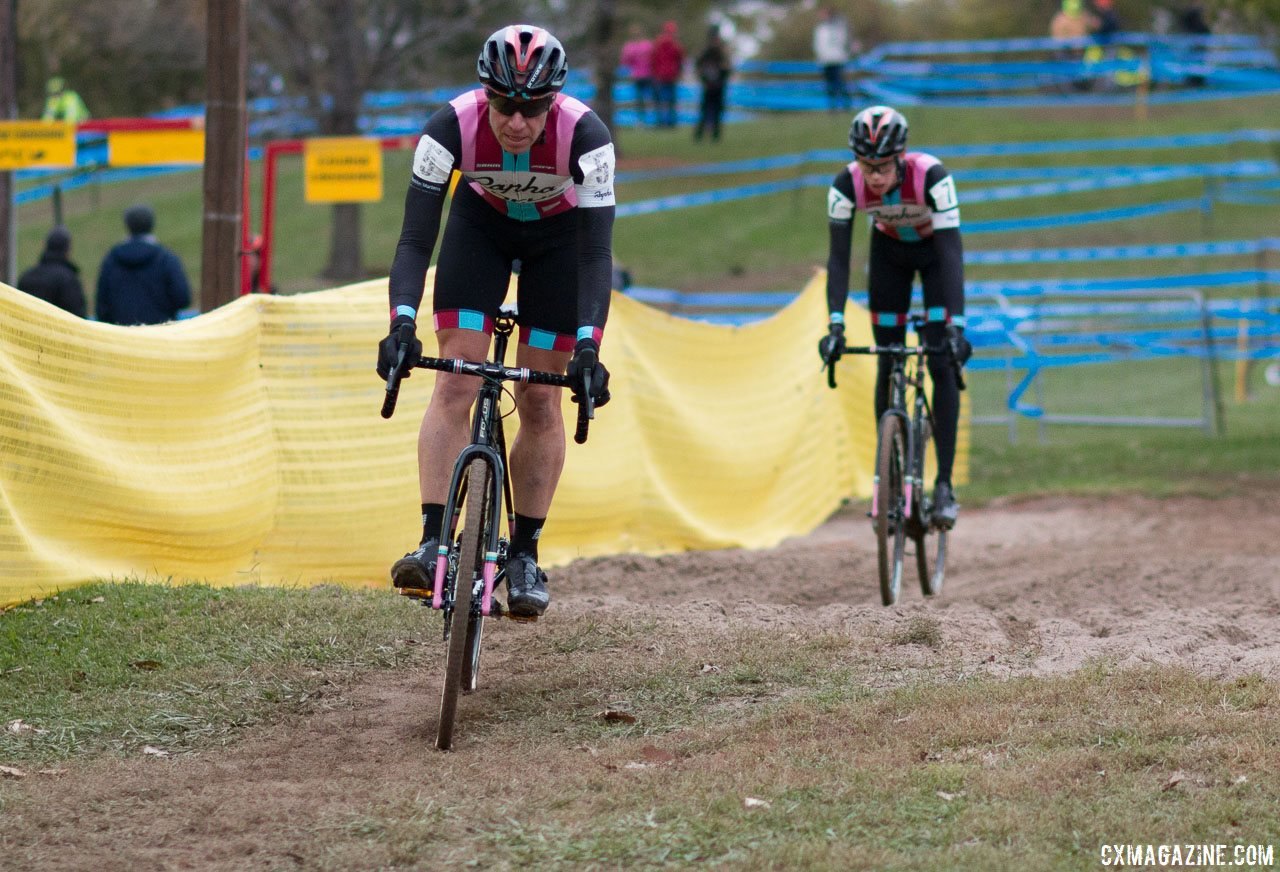
Powers helped mentor Spencer Petrov with Aspire Racing last year. Elite Men, 2017 Cincinnati Cyclocross, Day 2, Harbin Park. © Cyclocross Magazine
CXM: Well cool, thank you so much. It’s good to catch up with you and see you’ll be racing again. American cyclocross won’t be the same without you, so I think you have to race until you’re 70.
JP: That’s very nice of you to say. Thank you.
CXM: Good luck with the rest of your drive, and we look forward to seeing you at Trek.
JP: Great. Thank you.

